https://philaholisticclinic.com/natural-treatment-for-endometriosis/
Treatment for endometriosis will normally be medications or surgery and which will depend on the severity of the symptoms and whether or not pregnancy is an option in the future. Normally surgery will only be the last option and medications will be tried first.
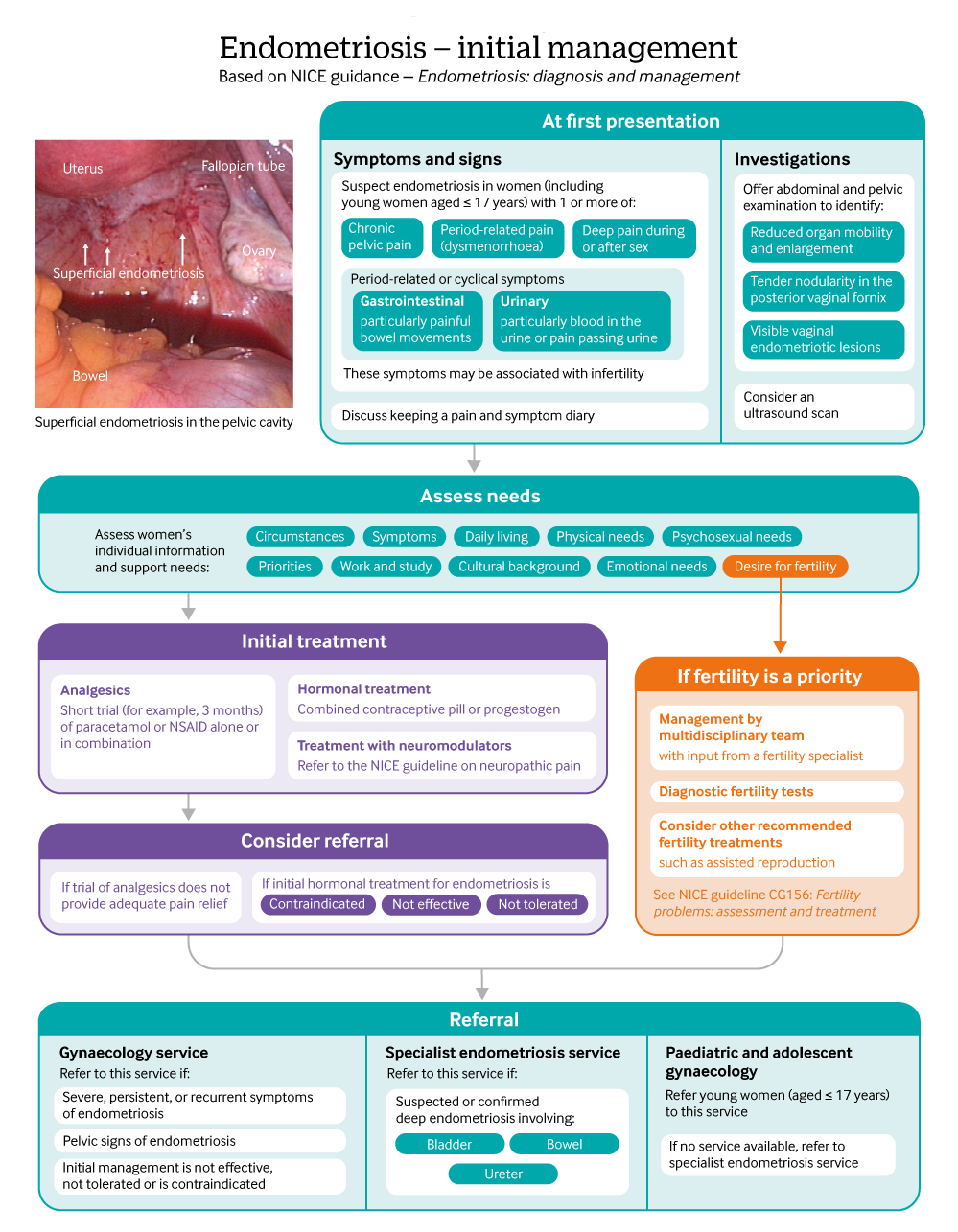
Medication
Normally for controlling the pain, and over-the-counter medication such as ibuprofen including Advil or Motrin will be recommended however if these do not control the pain and cramps then other, stronger medications may be prescribed. You should not exceed the maximum daily dose recommended by the manufacturer of the pain relief pills.
Hormone supplements
This can be effective in relieving or even eliminating the pain associated with Endometriosis, this is because it is the rise and fall of the hormones during the menstrual cycle that can cause the endometrial to thicken, breakdown, and bleed.
Birth Control pills are one method that may be tried and is often successful. Hormonal birth control contraceptives can help by making the menstrual flow lighter and of shorter duration, especially when they are a continuous cycle use, and this has been found to lessen or eliminate the pain of mild to moderate Endometriosis. The gonadotropin-releasing hormone can also be prescribed. This blocks the production of certain hormones and prevents menstruation. This will cause endometrial implants to shrink and can force Endometriosis into remission for the period of the treatment and sometimes several years after treatment has stopped.
This treatment can cause artificial menopause and with that comes certain side effects such as hot flashes and vaginal dryness, however, taking a low dose of estrogen may lessen these side effects. It is commonly believed that if this treatment does not stop the pain then Endometriosis is probably not the cause of your symptoms. Another similar hormonal treatment is Danazol. It also stops the production of the ovary stimulating hormones and prevents menstruation.
Elagolix
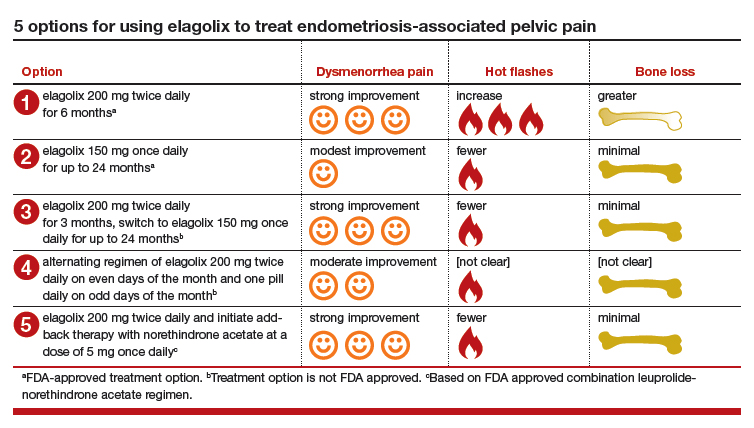
The formulation of the GnRH antagonist known as Elagolix has been studied since 2008 as a potential target for endometriosis and uterine fibroids. It binds competitively to GnRH receptors in the pituitary gland and results in negative estrogen regulation. Like some other endometriosis treatments, such as GnRH agonists, Elagolix depends on suppressing ovarian estrogen production through the hypothalamic-pituitary-ovarian axis. Unlike injected GnRH agonists, Elagolix is an oral formulation that exerts almost immediate action and does not present an initial pituitary exacerbation, in addition to suppressing estrogen depending on the dosage used. As an oral formulation, Elagolix can be discontinued more easily in the case of intolerance to the drug. The typical use of leuprolide acetate for suspension of deposit (Lupron Depot®) is six months (longer if addition norethindrone is used).
Orilissa
The Food and Drug Administration has approved a new drug Orilissa that could make life with endometriosis easier for more than 10 percent of women who live with the painful and sometimes debilitating condition.
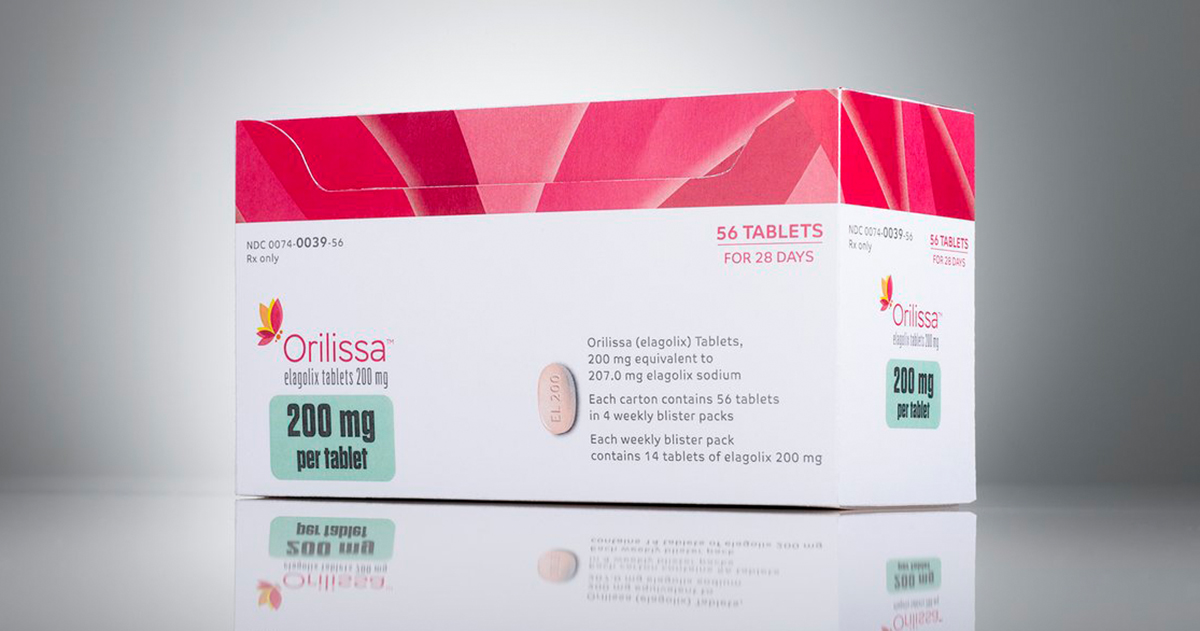
One of the goals of treatment is to try to break this cycle by using drugs that reduce inflammation or the presence of estrogen. In the past, birth control pills that maintain a woman’s estrogen levels were used to reduce the level of the hormone or Motrin and Advil, which belong to the category of anti-inflammatory drugs.
Another treatment option is to prevent the body from making so much estrogen in the first place – a method that was previously done by injecting Orilissa, the newly approved drug by the FDA and made as a daily pill.
Conservative surgery.
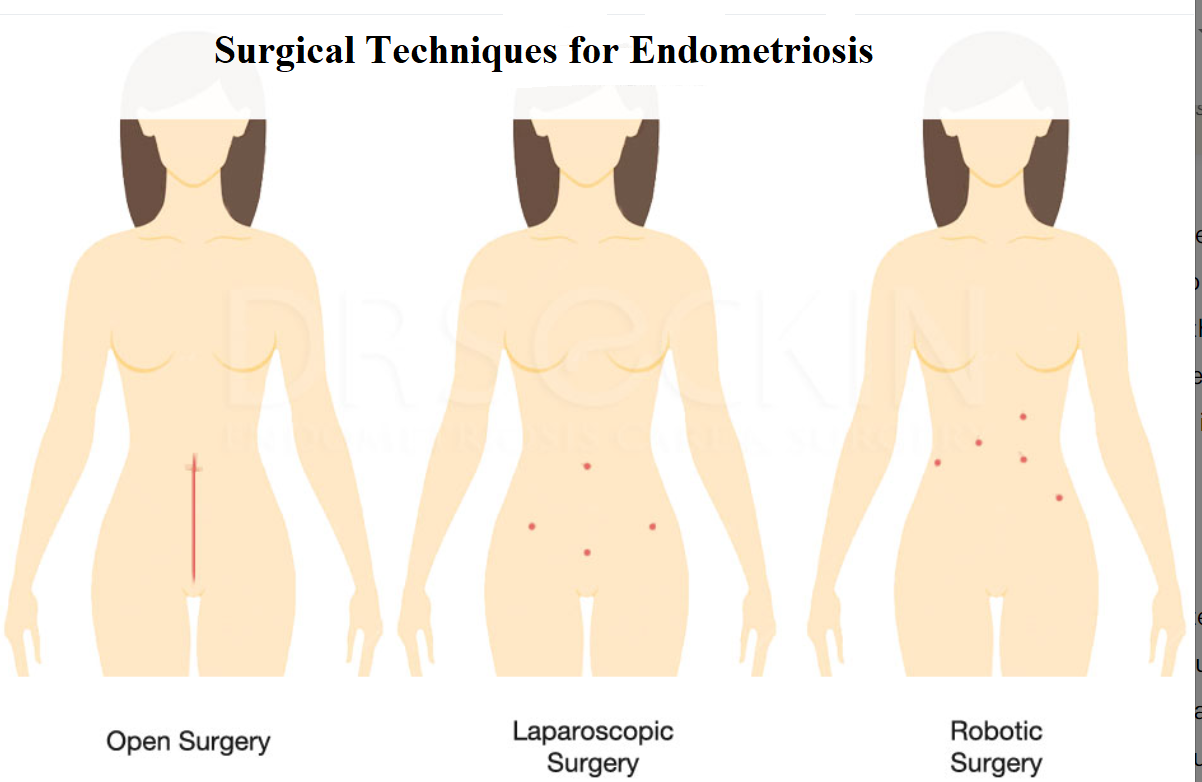
This is where only the endometrial growths, scar tissue, and adhesions are removed and the reproductive organs are left alone. This is an option if pregnancy is an option for the future. Often laparoscopic surgery is used for this procedure although sometimes traditional abdominal surgery will be required.
A second surgical option that may be considered, especially if pregnancy is not an option, is a total hysterectomy. The uterus and the cervix are removed as well as both ovaries. Hysterectomy by itself is not a real option as the estrogen produced by the ovaries can stimulate and Endometriosis that may remain and the symptoms would also remain. This surgical option is normally used as a last resort only, especially during the reproductive years.
What is endometriosis?
Endometriosis is a health disorder that occurs when the cells from the uterus grow in places outside of the uterus where they do not belong. Specifically, when a woman has her period, instead of these cells being passed out, they implant themselves in areas such as the ovaries, rectum, or other areas of the pelvic region.
Endometriosis is a disease that usually affects only women. The women who suffer from endometriosis experience a multitude of symptoms including fatigue, pelvic pain of differing severity, heavy menstrual periods, painful sexual intercourse, lower back pain, painful bowel movements and urination, abdominal bloating, and infertility.
It can be gleaned that endometriosis may be one of several body infirmities signaling a hormonal imbalance, which is experienced by women of varying ages – from their 20s to their 40s and beyond.

Some women afflicted with endometriosis tend to be susceptible to other ailments. A survey of more than 3,500 members of a reputable association in the US grappling with endometriosis revealed that 20 percent of the female survey respondents were suffering from some other illness, and chronic fatigue syndrome, as well as hypothyroidism and fibromyalgia, were common, along with autoimmune inflammatory diseases which occurred in numerous cases. There was also a higher incidence of allergies and asthma experienced by women with endometriosis compared to the general US population. What these survey findings point out is that endometriosis has a strong link with autoimmune disorders. Bolstering the immune system is therefore crucial.
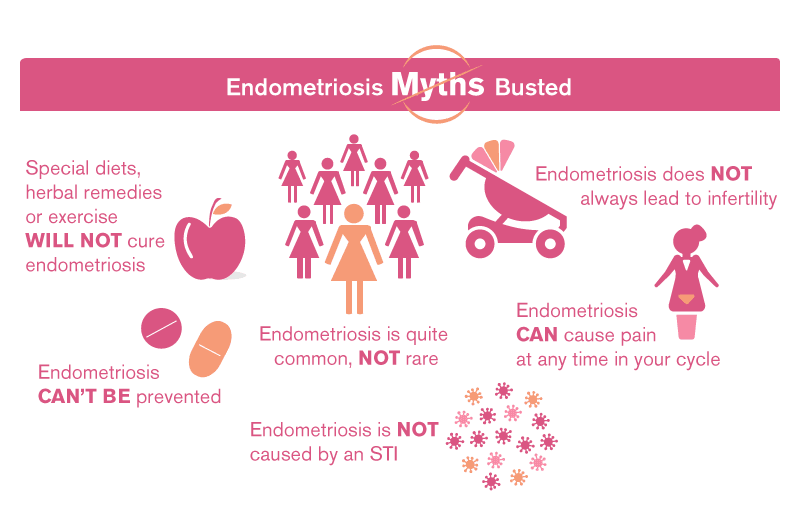
What causes endometriosis?
The true causes of endometriosis are unknown, but there are a few widely accepted theories. If you have been diagnosed with endometriosis, then you may have some questions about its causes and problems.
Possible causes of endometriosis
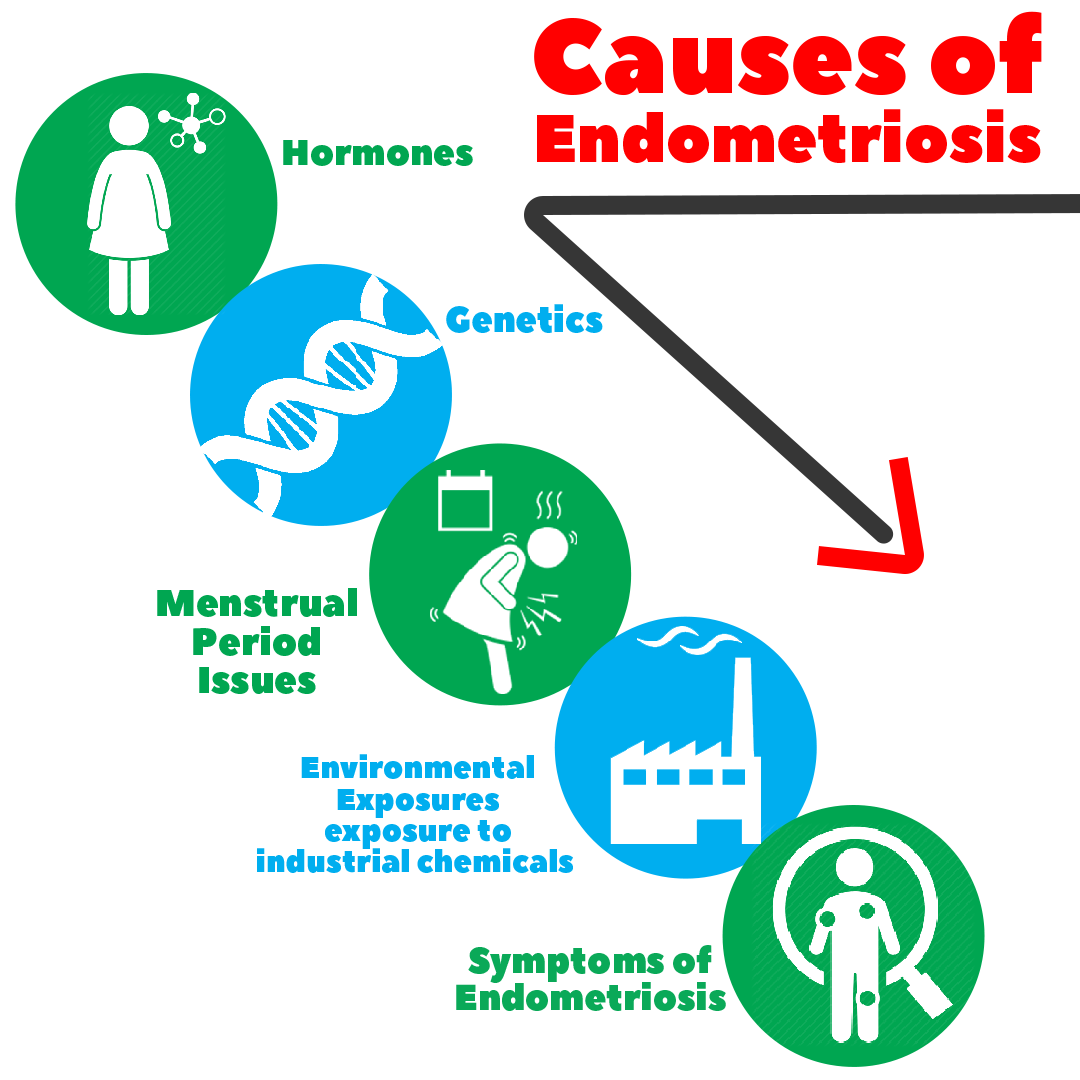
Shedding of uterine lining cells
- It is believed that during the monthly period when the uterine lining is shed, some of these cells travel up the fallopian tubes rather than being expelled through the cervix and out of the vagina. These cells are then thought to implant themselves into the endometrial cavity, attaching themselves to various organs such as the ovaries, abdominal cavity, and fallopian tubes.
Growth of endometriosis cells
- Another theory is that endometrial cells grow and develop within the uterus as the conditions are perfect. The rich blood supply and supply of nutrients can help the tissue to develop rapidly.
Hereditary theory
- There can be a family tendency to develop endometriosis and it is thought that baby girls may be born with rogue stray cells within the abdominal cavity.
The environment
- It is thought that women exposed to environmental toxins run a greater risk of developing endometriosis along with other disorders. Some of these toxins are known to contribute to hormonal imbalances within the body which, in turn, are thought to be a cause of endometriosis. These toxins and chemicals can come from pesticides, food additives, and common household substances such as soft plastics, aerosols, detergents, and certain cosmetics.
Disorders of the liver
- The liver is responsible for the breakdown and excretion of hormones and other substances, thus regulating the levels within the body. It is believed that a buildup of certain hormones can contribute to imbalances within the body which are thought to be possible causes of endometriosis.
The range of possible causes for this condition is why treatment can be so difficult. Unless the root cause can be eradicated, then it is likely that the condition will return, even following surgery or hormonal treatments.
Symptoms of endometriosis
The symptoms of endometriosis involve severe pain especially during the monthly periods and the pain is far more severe than the normal pains associated with periods.
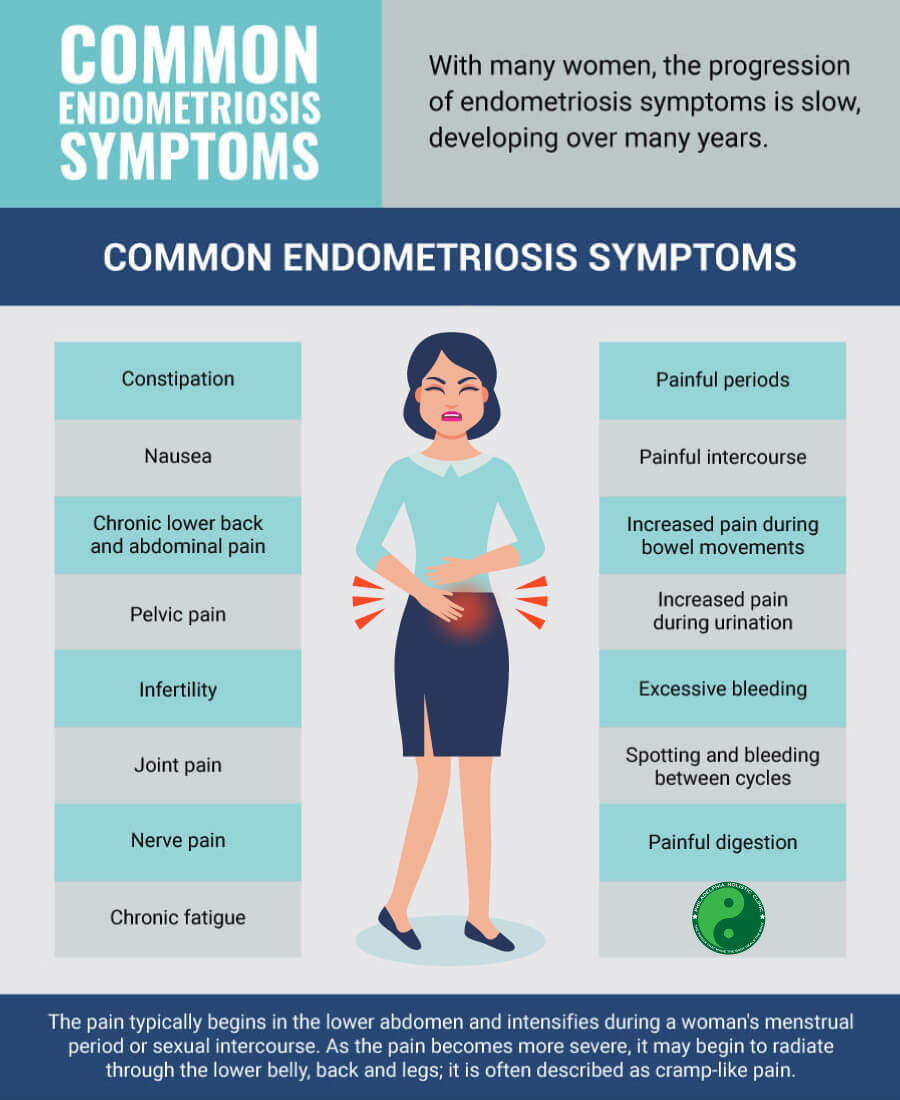
Other endometriosis symptoms include
- Menorrhagia or excessive bleeding
- Bleeding in between periods
- Pain during sexual intercourse or bowel movements.
- Dull, heavy feeling along the pelvic area and lower back that can occur anytime, without warning. In some women, the condition is experienced throughout the day.
- Because the endometrial tissue can become attached to non-reproductive organs such as the large intestine or bladder abdominal swelling can occur. These women can also experience painful bowel movements, painful urination, bleeding from the rectum, and nausea or vomiting before their period begins.
- Fatigue is a major symptom of endometriosis. The constant pain and discomfort combined with the body’s fight to rid itself of the trapped menstrual fluid do cause extreme exhaustion. As the endometrial tissue grows and expands in the abdominal cavity it causes greater and greater fatigue. Women who suffer from endometriosis also run a greater chance of getting chronic fatigue syndrome.
Endometriosis may also decrease fertility in women and is also more common in women who have had no children. Approximately 1 in 10 women suffer from endometriosis.
Endometriosis and infertility
Endometriosis is a condition that occurs in women during their reproductive age. Endometriosis and infertility are most likely associated with each other due to the effect or contribution of the disease to infertility. In this condition, the endometrial tissue that surrounds the lining of the uterus grows and reaches the outside part of it. Due to this progressive condition, it may also infect the other parts of reproductive organs that are mainly located in the abdominal such as fallopian tubes and ovaries.
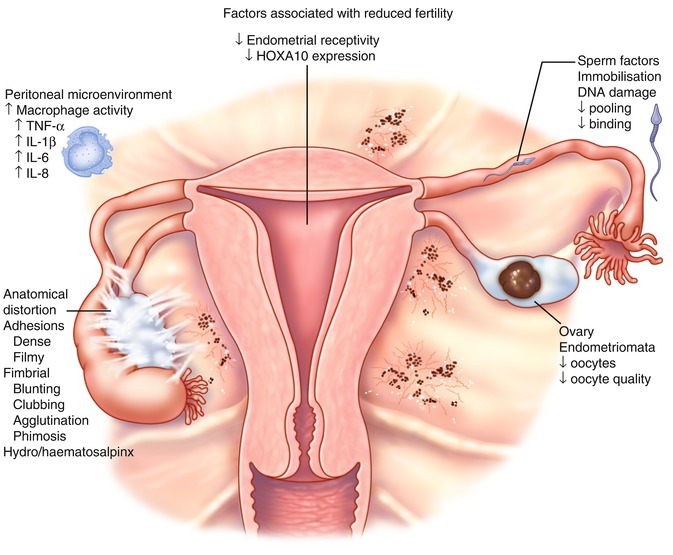
Studies show that 40%-50% of infertile women do have endometriosis. Infertility is one of the effects of endometriosis. It is a progressive condition that could cause abnormal and painful menstruation as well as painful sexual intercourse. Endometriosis and infertility is not a hopeless case. Do not fear that you could not have or bear any child anymore. Treatment and medication are always available.
Complications associated with endometriosis
Complications include:
- Infertility, which can affect 50 percent of those with the condition.
- Increased risk of developing ovarian cancer or endometriosis-associated adenocarcinoma
- Ovarian cysts
- Inflammation
- Scar tissue and adhesion development
- Intestinal and bladder complications
It is important to see a health care provider about symptoms, to avoid future complications.
Natural treatment for endometriosis
Natural treatment for endometriosis is another treatment option for endometriosis that has been proven to be effective to reduce the symptoms of endometriosis.
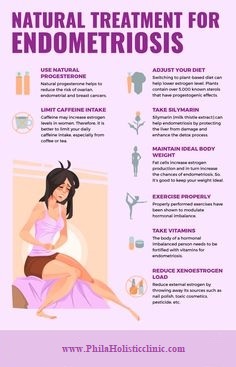
Natural treatment for endometriosis has been proven to be helpful in the treatment of endometriosis. Listed below are the most common, effective, and safe natural remedies for endometriosis:
Home remedies for endometriosis – most common natural treatment for endometriosis
Home remedies for endometriosis can help ease the symptoms of endometriosis without causing any side effects. Some home remedies for endometriosis are listed below:
- Reduce any form of chemical intake. The best way of reducing the chemical intake is to reduce the intake of any form of animal fat, fish, and red meat. The accumulation of fat can lead to this horrid disease. Eat a lot of fresh vegetables and fruits.
- The use of progesterone cream helps in reducing the growth of the endometrial tissues. Apart from reducing the growth, this is also helpful in reducing the pain and the cramps experienced during the time of menstruation.
- The use of omega 3 fatty acid has been proved helpful to people who suffer from endometriosis. These are available in form of capsules and should again be taken with assistance from a physician with regards to the schedule.
Herbs for endometriosis – effective and safe natural treatment for endometriosis
Herbs for endometriosis represent the category of natural remedies for endometriosis that are available in most health stores, they are inexpensive and most importantly they do not cause any side effects. Certain medicinal herbs can be used to control the symptoms of this condition. Some of these herbs for endometriosis contain natural elements that are similar to the synthetic hormones used for treating endometriosis.
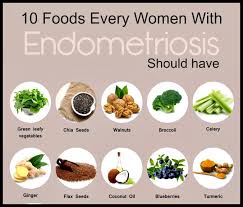
The followings are some of the herbs for endometriosis that can be used to control the symptoms of endometriosis;
- This herb is very important because it helps to suppress the pelvic pain normally experienced by those suffering from endometriosis.
- This herb helps to suppress the pain originating from a bowel movement. It also reduces the painful cramps associated with menstruation, particularly for women suffering from endometriosis.
- This particular herb performs a multipurpose function. It helps to treat various kinds of reproductive problems in women, and also helps to reduce the pain and cramping symptoms that normally accompany endometriosis.
- This herb for endometriosis can help with endometriosis. They are useful for maintaining the estrogen level. This is a hormone that causes endometriosis when it is abnormally produced in the body.
- This herb is very rich in lignans which are believed to help control endometrial cancer.
Acupuncture for endometriosis – ancient Chinese natural treatment for endometriosis
Acupuncture practitioners promote acupuncture for endometriosis as a natural treatment for endometriosis that is less risky and less costly. It also has no side effects other than the drugs and surgery recommended by conventional medicine.
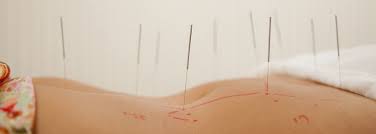
If you decide to try acupuncture for endometriosis, plan for the initial course of treatment to last six to eight weeks with visits once or twice a week. After the first phase, your practitioner might switch the regimen to two weeks a month. Commonly, you would be told to expect results in three to six months.
Your acupuncture practitioner would also recommend nutritional therapy that could include herbal formulas.
Yoga for endometriosis – ancient Indian natural treatment for endometriosis
Yoga provides a form of exercise that focuses on easy to do poses and breathing. It is a great routine to implement if you suffer from Endometriosis as yoga for endometriosis shows you how to slow down and feel more powerful and in control of your life.
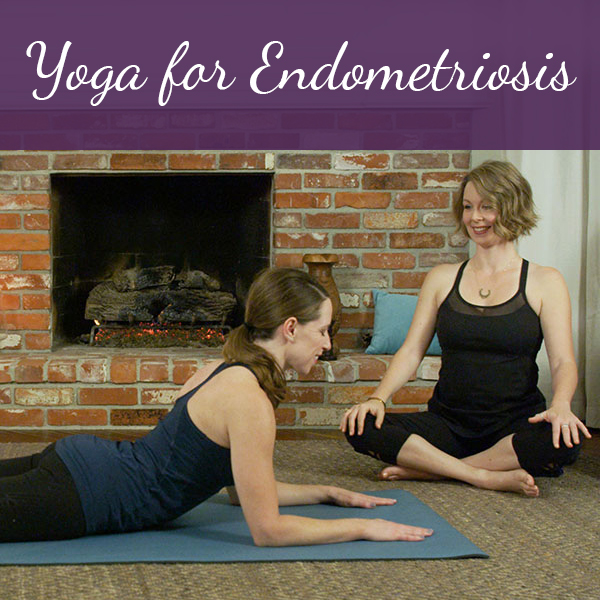
Emotions are eased through a focus on breathing and balance movements. Physically it helps with digestion and loosening tense muscles throughout the body, while also building inner core strength. Yoga has been widely used to help women with Endometriosis because of these recognized benefits. Specific poses can be used to alleviate the immediate pain of muscle tension within the lower abdominal area.
Homeopathy for endometriosis – #1 natural treatment for endometriosis
Homeopathy for endometriosis works on a holistic basis and does not lead to any side effects commonly endured in conventional therapy. Homeopathy assures you complete regain of health and does not support toxic suppression of any disease.
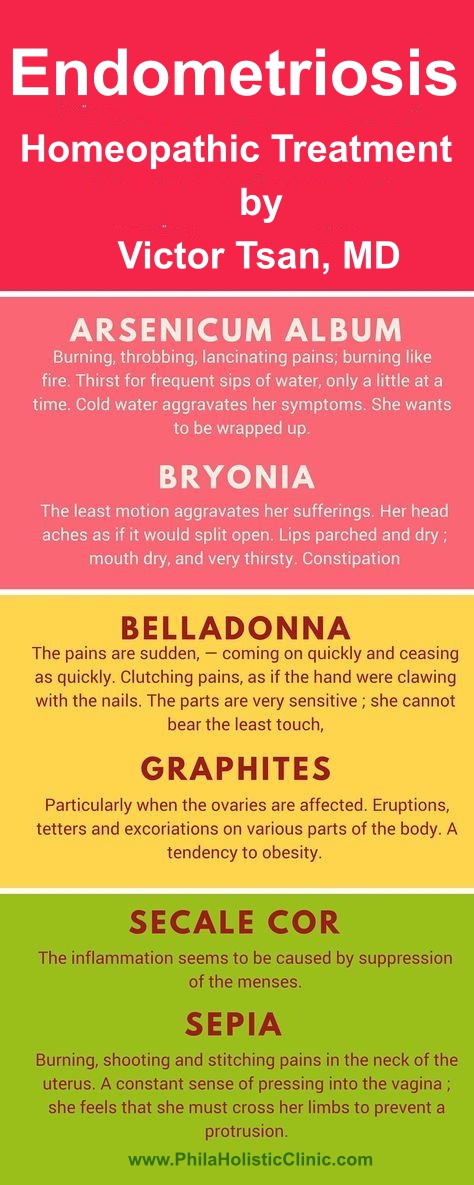 Moreover, homeopathy for endometriosis helps in preventing the relapse of the condition. Homeopathic remedies for endometriosis provide complete holistic wellbeing to the patient by boosting immunity and assisting recovery most safely and naturally.
Moreover, homeopathy for endometriosis helps in preventing the relapse of the condition. Homeopathic remedies for endometriosis provide complete holistic wellbeing to the patient by boosting immunity and assisting recovery most safely and naturally.
Listed below are homeopathic remedies for endometriosis
Sepia:
- One of the leading homeopathic remedies for endometriosis with irregular menses.
Nux Vomica:
- This homeopathic remedy for Endometriosis is ideal for irregular and painful menses with marked pain in the pelvis and constant urging for stool.
Murex:
- Effective homeopathic remedy for Endometriosis of chronic type with extremely painful periods and pain in breasts during menstruation.
Conclusion
Endometriosis is a serious condition that not only diminishes the quality of life of the woman but also causes problems from the organs located in the abdomen when the endometrium grows over them. Thus, endometriosis is not a disease that can be ignored. Unless woman receives a proper treatment the symptoms of endometriosis that she is experiencing will only get worsen. It’s up to a woman what kind of treatment to choose (allopathic or naturopathic) but either way, she has to see a well-trained physician and discuss her best options.
If you are looking for natural treatment of endometriosis consider seeing an integrative medicine practitioner.
The medical director of the Philadelphia Holistic Clinic Victor Tsan, MD works the first 10 years of his medical career in OBGYN and he knows and understands the pathology of endometriosis from his 40+ years of academic and clinical experience.
To see Dr. Tsan for evaluation and treatment contact our clinic (267) 284-3085 and schedule your appointment
Comments
Post a Comment